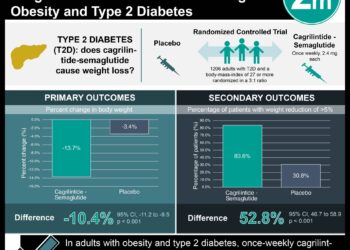Sodium-glucose cotransporter 2 inhibitors may reduce incidence of respiratory events in Type 2 diabetics
1. In this retrospective cohort study, patients with Type 2 Diabetes (T2D) using sodium-glucose cotransporter 2 inhibitors (SGLT2is) were found to have a lower incidence of adverse respiratory events than patients using dipeptidyl peptidase-4 inhibitors (DPP4is).
Evidence Rating Level: 2 (Good)
Type 2 Diabetes (T2D) shares a similar pathophysiological background with respiratory disease. Specifically, glucose levels of the airway surface liquid (ASL) influence respiratory dysfunction; low glucose levels in the ASL help prevent pulmonary infections and the exacerbation of respiratory diseases. Antidiabetic drugs reduce glucose levels, and accumulating evidence suggests that sodium-glucose cotransporter 2 inhibitors (SGLT2is) may offer greater benefit with respect to respiratory outcomes. SGLT2is have been found to reduce the risk of respiratory disorders, pneumonia, and respiratory failure versus dipeptidyl peptidase-4 inhibitors (DPP4is). This retrospective cohort study aimed to determine whether the use of SGLT2is is associated with the risk of adverse respiratory events among patients with T2D compared to DPP4is. Data was collected using the Health Insurance Review and Assessment Service (HIRA) database of South Korea. Patients who were newly prescribed an SGLT2i or DPP4i between January 2016 and December 2020 were identified and included in the study. The primary outcome studied was respiratory events, defined as a composite endpoint including acute pulmonary edema, ARDS, pneumonia, and respiratory failure. In total, after propensity score matching, 205,534 patients were included in each treatment group. With respect to the primary outcome, SGLT2i users displayed a lower incidence of adverse respiratory events when compared to DPP4i users (incidence rate 4.54 versus 7.54 events per 1000 person-years; rate difference: − 3.00, 95% CI − 3.44 to − 2.55). SGLT2i users had lower risks of the composite respiratory endpoint (HR 0.60, 95% CI 0.55 to 0.64), as well as acute pulmonary edema, pneumonia, and respiratory failure. The same trends persisted even after subgroup and stratified analyses, in each age, sex, history of asthma, history of COPD, history of CVD, history of CKD, and history of baseline insulin use subgroup. Overall, the findings from this study suggest that among patients with T2D, SGLT2i users had a 40% lower risk of adverse respiratory events than DPP4i users. A major limitation of this study is the homogenous patient population, as the study was completed in South Korea, which may affect the generalizability of the data. However, this study is an important addition to the growing body of evidence surrounding T2D and respiratory events and will guide further research.
Click to read the study in BMC Medicine
Image: PD
©2023 2 Minute Medicine, Inc. All rights reserved. No works may be reproduced without expressed written consent from 2 Minute Medicine, Inc. Inquire about licensing here. No article should be construed as medical advice and is not intended as such by the authors or by 2 Minute Medicine, Inc.






